Just Heard “turns Out, Shockingly, That You Can’t Pray Away Your Gay Thoughts Because You Can’t
just heard “turns out, shockingly, that you can’t pray away your gay thoughts because you can’t pray away your capacity for love” from a wise Christian queer man on a tiktok comp, and i thought it’d be wise to share
More Posts from Quovadisjeanne and Others
something bout. how even Christ did not carry the cross alone.

Florentine School ~ 17th Century, The Archangel Michael
[Source: Sotheby’s]
i don't know what gay draping themselves sensually while bleeding out needs to hear this but st sebastian survived the arrows. let yourself be tended to and let the holes scar over. we have work to do. you need to harangue every empire in your path, to prophesy to your archers. you must become irene and nurse others bleeding back to health. yes spoiler alert we'll all be beaten to death if we keep it up but so it goes. we've never claimed to have a practical religion, just one that looks good suffering in paintings and then comes back to life. the second bit is longer and harder than the first. may as well start today
The most devastating and heartwrenching thing about the Last Supper is that Jesus knew that His disciples, His friends will betray him. Still, He washes their feet, and still, He gives them His blood and body.
And this is the tragedy of God, that He dies for those who are not just abstractly imperfect and who have done something nasty, He dies for people who betray Him daily.
He says: here, I give you the Kingdom, to you who betray me, here, I give you the Kingdom, I've bought it for you with my blood.
And this is the tragedy of Man, that He must carry all that sorrow in Himself, in His human body (it is unthinkable for humans, impossible). And the sorrow evidently eats Him alive, He tries to comfort Himself in His last hours, so He spends them with apostles. Jesus is eager to find a shoulder to lay His head on, a shoulder to cry on. But He has no one to share the sorrow with who won't betray Him, He is alone in that. He has no one who would even understand His sacrifice, oh no, no one would even care to stay awake with Him.
So He turns to the Father, He prays and prays and in His last moments, it's only the Son and the Father who are left. But even the Father leaves Him. Everyone leaves Him, Everything leaves Him. Candles out, it's dark, the Saturday will be quiet.

He has risen yayy
jesus did not appear to his mother first. some may say that, but the title of the first seeing, the apostle of apostles, belongs to mary magdalene, the saintly penitent-- the bible tells us so. god in flesh appeared not to his rock, but to little magdalene. she is quick to tell all, even when others look at her with disbelief and, maybe, even a little fear. she's seen him! the christ! how could she keep her lips sealed? it would be like asking her heart to stop in her chest.
when she tells mary, mary weeps. mary believes-- always has, ever since the savior of all was but an embryo in her womb. since he was a helpless infant at her breast. a mischievous child. the boy who would pierce her heart. yes, mary knows that her son has risen, believes the magdalene with her whole heart.
but
but where was he? why had the other marys seen him, and the rock, and the beloved, why had he appeared to them all but not her? and mary, mother of god, the mother of humanity, doubts. not in her son's brilliance. not in his resurrection, or in his love of her. she doubts herself. why would he not come to her? had she failed him so on calvary, standing and weeping, that he no longer wished to see her? was he angry? she knew he loved her, as he loved all, but it hurt, hurt to see the magdalene's happy tears and know not if he smelled the same reborn as he did when she first held him.
mary weeps. not in front of the others, her children, her boys and girls, beloved disciples of her christ, but alone, as she prays.
"woman, why are you crying?"
the voice is soft, and mournful. there is guilt hidden there, that only a mother could hear. and at once, she is back, back with her embryo, back with her baby, her mischievous child marred with holes. he is wounded, scarred, perfect, and he is alive.
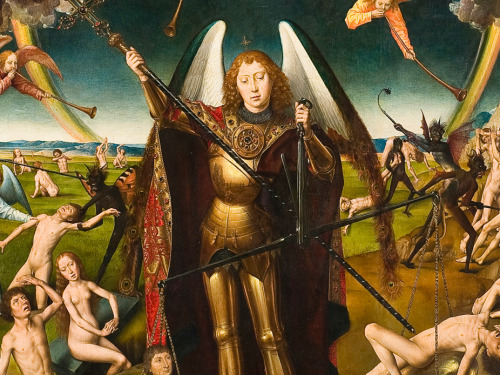
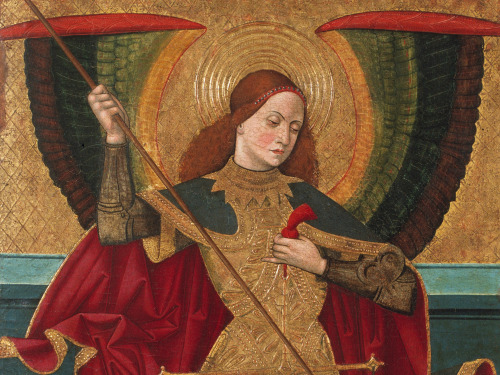
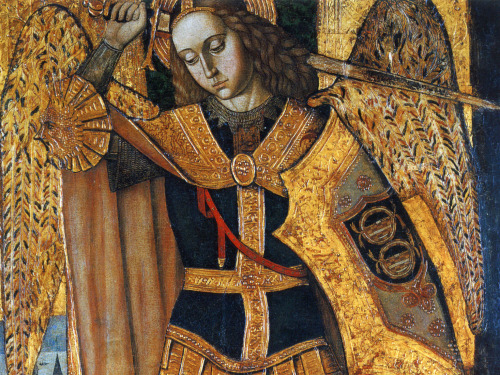
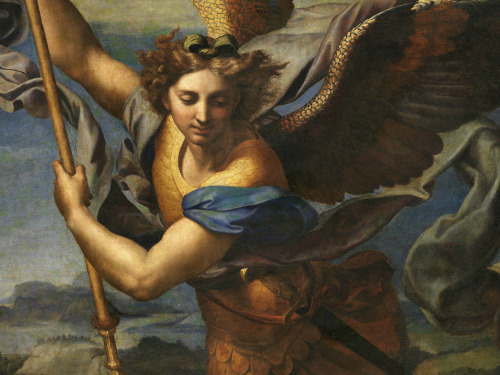
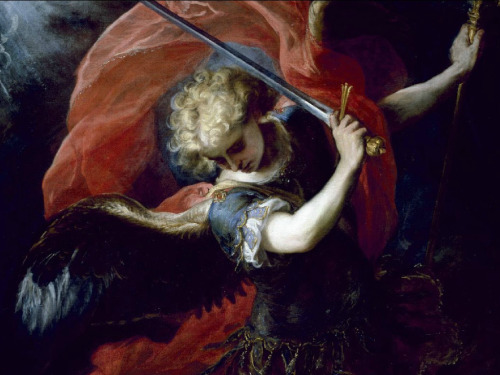
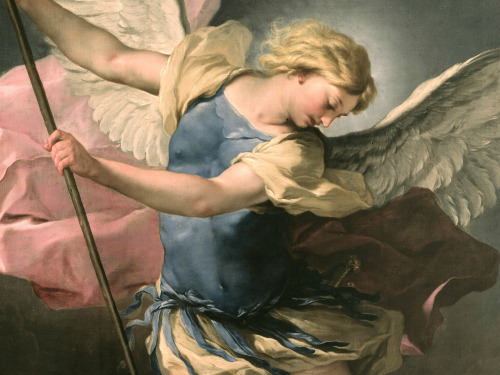
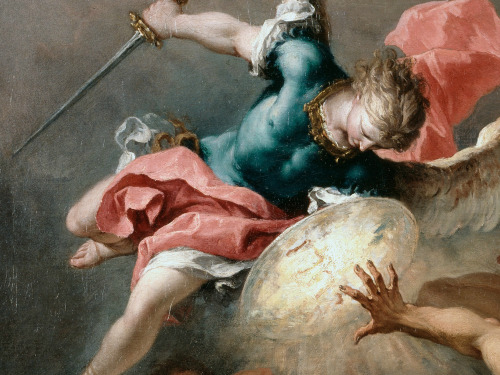
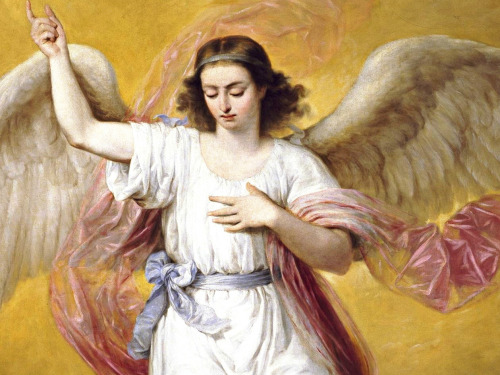
Archangel Michael through Art History
Hans Memling, c.1466-1473 Juan de la Abadia, c.1480-1495 Master of Castelsardo, 16th century Raphael, 1518 Claudio Coello, c.1660 Luca Giordano, 1663 Sebastiano Ricci, c.1720 Antonio María Esquivel, 1840

from Philadelphia Gay News, 1976
-
 cavernofthewillowtree reblogged this · 1 month ago
cavernofthewillowtree reblogged this · 1 month ago -
 nebulus-collective liked this · 1 month ago
nebulus-collective liked this · 1 month ago -
 youredyingthatsallthereis liked this · 1 month ago
youredyingthatsallthereis liked this · 1 month ago -
 monsterpegger001 liked this · 1 month ago
monsterpegger001 liked this · 1 month ago -
 4l3xsworld liked this · 1 month ago
4l3xsworld liked this · 1 month ago -
 fullpersonadonut reblogged this · 1 month ago
fullpersonadonut reblogged this · 1 month ago -
 itrulywasatonepoint liked this · 1 month ago
itrulywasatonepoint liked this · 1 month ago -
 writer-fennec reblogged this · 1 month ago
writer-fennec reblogged this · 1 month ago -
 writer-fennec liked this · 1 month ago
writer-fennec liked this · 1 month ago -
 zolanibor liked this · 1 month ago
zolanibor liked this · 1 month ago -
 sheriffofshalott liked this · 1 month ago
sheriffofshalott liked this · 1 month ago -
 samualjennings liked this · 1 month ago
samualjennings liked this · 1 month ago -
 skorchinq reblogged this · 1 month ago
skorchinq reblogged this · 1 month ago -
 skorchinq liked this · 1 month ago
skorchinq liked this · 1 month ago -
 enigmatic-rain liked this · 1 month ago
enigmatic-rain liked this · 1 month ago -
 gutz-radio liked this · 1 month ago
gutz-radio liked this · 1 month ago -
 jay0fspad3s liked this · 1 month ago
jay0fspad3s liked this · 1 month ago -
 slowlypoking liked this · 1 month ago
slowlypoking liked this · 1 month ago -
 tarnished-ankh liked this · 1 month ago
tarnished-ankh liked this · 1 month ago -
 senti-nell liked this · 1 month ago
senti-nell liked this · 1 month ago -
 dragon--ashes liked this · 1 month ago
dragon--ashes liked this · 1 month ago -
 lemonlovr liked this · 1 month ago
lemonlovr liked this · 1 month ago -
 autumnkissess liked this · 1 month ago
autumnkissess liked this · 1 month ago -
 badswimmingmermaid liked this · 1 month ago
badswimmingmermaid liked this · 1 month ago -
 attystark liked this · 1 month ago
attystark liked this · 1 month ago -
 salsa-and-light reblogged this · 1 month ago
salsa-and-light reblogged this · 1 month ago -
 mooseinmoss liked this · 1 month ago
mooseinmoss liked this · 1 month ago -
 lord-starquaad reblogged this · 1 month ago
lord-starquaad reblogged this · 1 month ago -
 beeboopneep liked this · 1 month ago
beeboopneep liked this · 1 month ago -
 mischeviousindivual liked this · 1 month ago
mischeviousindivual liked this · 1 month ago -
 nears-robot liked this · 1 month ago
nears-robot liked this · 1 month ago -
 not-so-superheroine liked this · 1 month ago
not-so-superheroine liked this · 1 month ago -
 singinintheraine liked this · 2 months ago
singinintheraine liked this · 2 months ago -
 liliyawnas reblogged this · 2 months ago
liliyawnas reblogged this · 2 months ago -
 liliyawnas liked this · 2 months ago
liliyawnas liked this · 2 months ago -
 usetobeapinetree reblogged this · 2 months ago
usetobeapinetree reblogged this · 2 months ago -
 usetobeapinetree liked this · 2 months ago
usetobeapinetree liked this · 2 months ago -
 scrawdragon reblogged this · 2 months ago
scrawdragon reblogged this · 2 months ago -
 scrawdragon liked this · 2 months ago
scrawdragon liked this · 2 months ago -
 agnus-dei1312 reblogged this · 2 months ago
agnus-dei1312 reblogged this · 2 months ago -
 agnus-dei1312 liked this · 2 months ago
agnus-dei1312 liked this · 2 months ago -
 stardustkarim reblogged this · 2 months ago
stardustkarim reblogged this · 2 months ago -
 stardustkarim liked this · 2 months ago
stardustkarim liked this · 2 months ago -
 eastcoast-envy liked this · 2 months ago
eastcoast-envy liked this · 2 months ago -
 quovadisjeanne reblogged this · 2 months ago
quovadisjeanne reblogged this · 2 months ago -
 wyrmofworms liked this · 2 months ago
wyrmofworms liked this · 2 months ago -
 dumpstertrash liked this · 2 months ago
dumpstertrash liked this · 2 months ago -
 relativelywellknown liked this · 2 months ago
relativelywellknown liked this · 2 months ago -
 pretendthisisreal liked this · 2 months ago
pretendthisisreal liked this · 2 months ago -
 justdumbrat liked this · 2 months ago
justdumbrat liked this · 2 months ago
20s. all pronouns. religious sideblog. greek orthodox. just a place to reblog stuff so as to not annoy my followers on my main @fluxofdaydreams
170 posts


